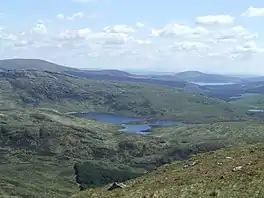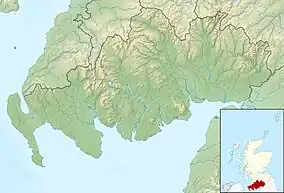Loch Neldricken
Loch Neldricken is a loch in Galloway to the south-east of Merrick, south of Craig Neldricken and west of Craignaw. The loch is almost bisected by a long promontory. It drains via the short Mid Burn into Loch Valley and then via Gairland Burn down to Loch Trool.
| Loch Neldricken | |
|---|---|
 The loch with Craignaw in the background. | |
 Loch Neldricken | |
| Location | Galloway, Scotland |
| Coordinates | 55°07′00″N 4°26′20″W |
| Type | freshwater loch |
| Primary outflows | Mid Burn |
| Basin countries | United Kingdom |
| Surface elevation | ~350 m (1,150 ft) |
An inlet at the west of the loch is marked on maps as 'Murder Hole' and features in SR Crockett's The Raiders. However, the original 'Murder Hole' was a well on the Glen Trool to Straiton road where the bodies of travellers who had been robbed and murdered were dumped and Crockett moved the location for his book.[1][2]
The loch has suffered from acidification but has recovered to some extent, with the pH increasing from around 4.4 in 1978 to 5.4 in 2003.[3] Between 1983 and 2003 the loch's DOC levels increased.[4]
Water Analysis
| Element | Concentration μg/l |
|---|---|
| CaCO3 | 0.20 |
| Li | 0.403 |
| Al | 131 |
| V | 0.300 |
| Cr | 0.191 |
| Fe | 52.0 |
| Fe DRC | 49.8 |
| Mn | 9.1 |
| Co | 0.059 |
| Ni | 0.442 |
| Cu | 0.272 |
| Zn | 3.48 |
| As | 0.289 |
| Se | 0.232 |
References
- "Chapter Six - Rowantree Toll". The Grey Man. Archived from the original on 16 July 2011. Retrieved 20 June 2008.
- Colin Hogarth. "The Murder Hole". walkscotland.com. Retrieved 20 June 2008.
- "Recovery from Acid Rain Gives Hope to Scottish Upland Salmonid Populations". Fisheries Research Services. 21 November 2005. Archived from the original on 5 January 2017. Retrieved 25 June 2008.
- "Freshwater Environment Group" (PDF). Fisheries Research Services. Retrieved 28 June 2008.
- Craig D Robinson; Sylvie Charles; Iain A Malcolm; Sandhya Devalla (May 2007). "FRS METHOD FOR THE DETERMINATION OF TRACE METALS (INCLUDING RARE EARTH ELEMENTS) IN FRESHWATER SAMPLES BY INDUCTIVELY COUPLED PLASMA MASS SPECTROMETRY" (PDF). Fisheries Research Services. Retrieved 28 June 2008.